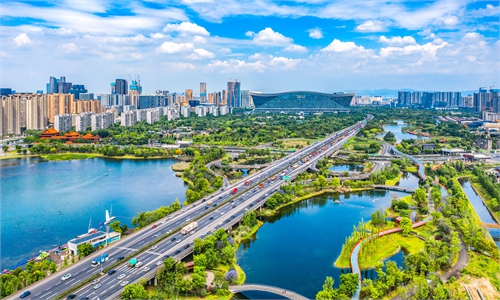
Illustration: Liu Xidan/GT
As the People's Republic of China turns 75 this year, it has many things worth celebrating. Seventy-five years may be a brief moment in human history, but the achievements China has made over that period are truly epoch-making.Growing up with the advances of reform, I have stood witness to how it has powered China's development and transformed the people's lives like never before.
In China, "reform" is not an abstract word detached from our life. Its benefits have been woven into the fabric of the day-to-day business of the ordinary people. Here I want to share with you two stories.
Balanced education: No kid should be left behind.
On June 18, 2024, shortly before the Third Plenary Session of the 20th Communist Party of China Central Committee, Chinese President Xi Jinping visited a middle school in Xining, Qinghai Province.
What is special about this school is that it was set up with the assistance of Shanghai Municipality to provide a good education for children from Golog Tibetan Autonomous Prefecture, a vast area in the hinterland of the Qinghai- Xizang Plateau where poor access to transport has made schooling difficult. Since its opening in 2019, the school has enrolled more than 1,400 students from the prefecture.
Nidong Lamao, a 15-year-old girl, left her county for the first time in September 2023 to study at this school. A few months later, she went on a study tour to Shanghai. Looking at the skyscrapers and bright lights along the Huangpu River in the Bund, she saw a totally different world and felt the huge advances of the country. From then on, she made it her goal to become a Putonghua teacher in underdeveloped areas and help more people there to become part of the wonderful stories of the country's development.
We cannot stress enough the importance of education, as children are the future of our country. Committed to promoting high-quality and balanced development of education, China has rolled out wide-ranging education reforms to narrow the gap between urban and rural areas, ensure equal access to education, and better allocate education resources across regions.
Care for the elderly: An elder is a treasure in the family.
A few years ago, wife of 83-year-old Wang Wenyi, who lives in Shenyang, Liaoning Province, had a heart surgery. As a result, Wang had to take care of her and their household, which became unbearable for the old man.
But thanks to the help from the Community Home Care Service Center, Wang has regained confidence in the old-age life. Equipped with such facilities as canteen, day care, remote medical care and rehabilitation therapy rooms, the Service Center has made elderly care conveniently available.
It provides healthy diet at affordable prices. There is a wide variety of food to choose from, and it is low in salt, sugar and oil. People aged over 80 are charged only 8 yuan ($1.1) per meal, while those aged between 60 and 80 pay 10 yuan a meal. For the elderly with mobility difficulties, workers of the Service Center even deliver meals for free.
Every day at 9:30 am, a nursing worker of the Center would come to Wang's home to help him look after his wife for three hours. And the services are free.
The Center also gives electronic wristbands to the elderly. When the wristband is connected to the internet, the elder's heart rate, blood pressure and other health data will be displayed on the platform of the Service Center, making remote monitoring of the elderly's health dynamics possible at fingertips.
So how do I feel about this? Respecting and taking good care of the elderly is one of the fine virtues of the Chinese nation. And we regard the elders as a uniting force in the family and a source of wisdom. Thus the Chinese saying goes, "An elder at home is a treasure in the family." In response to the population aging, China has stepped up efforts to develop elderly care programs to provide better services for the senior citizens, especially those who live alone. Since 2016, various localities have been exploring different forms of community home care services such as meal assistance and home visits, making elderly care services increasingly accessible to the people.
If you ask me what is the most prominent feature of Chinese reform, putting people's livelihoods above all else is my answer. Only when reform is carried out for the sake of the people can it be meaningful; only by relying on the people can reform gather momentum.
Reform also opens a window on China, through which the world has gained a better understanding of China's present and future. The two stories of reform I have just shared offer a glimpse of what China is doing for its people.
The author is a commentator on international affairs, writing regularly for Xinhua News, CGTN, Global Times, China Daily etc. He can be reached at xinping604@gmail.com.



